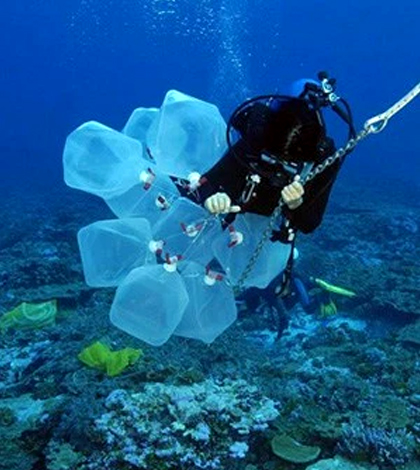Corals And Algae: Overfishing Ups Competition

A scuba-diving researcher from San Diego State University collects benthic microbial samples for metagenomic analysis using cubitainers. (Credit: Zafer Kizilkaya)
Coral reefs are some of the world’s most productive and diverse marine ecosystems, but it takes a lot to keep them operating in a healthy way. The corals and algae that form the base of a reef’s food web release a variety of nutrients that support a complex and efficient food chain. But when the system gets out of sync, it can break down and endanger the reef’s health.
Such is the case thanks to overfishing that removes the primary consumers of algae, allowing fleshy algae to spread unchecked. And in areas with large human populations, pollution often exacerbates that problem by stimulating the growth of algae.
Fleshy algae on reefs put out large amounts of nutrients including dissolved organic carbon that microbes eat. Researchers at San Diego State University and the University of Hawaii have guessed that, with elevated levels of algae producing meals for them, more potentially harmful microbes can propagate throughout reef ecosystems.
They set out to investigate the hypothesis by collecting more than 400 water samples from 60 coral reef sites across the Indian, Pacific and Atlantic Oceans. They used what many call cubitainers, or cube-shaped collection bottles that they scuba dived to coral reefs.
In the laboratory, they tested the samples for microbes that had the potential to harm reef organisms around the world.

Coral overgrown by fleshy algae. (Credit: Jennifer Smith / Scripps Institution of Oceanography)
First, they analyzed the abundance of microbes in the samples, finding that reef sites with higher algal cover also had more microbes. Using metagenomic sequencing techniques, they also found that the microbial community in algae-dominated reefs is more likely to harbor harmful pathogens. This pattern has geochemical implications for the ocean carbon cycle.
One prediction that the researchers were keen to investigate was that the microbes fostered by algal growth are voracious, stripping the reefs they live on of dissolved organic carbon and limiting the transfer of organic material to larger organisms like invertebrates and fish.
Sure enough, the team found that in reefs with high algal cover, such as the island of Kiritimati in the central Pacific Ocean, dissolved organic carbon concentrations were very low, whereas in reefs with low algal cover, the levels were higher. Across the 60 sampling sites and across three ocean basins, this relationship held true: As algal cover got higher, levels of dissolved organic carbon went down.
Essentially, the study’s results support the idea that microbialization associated with increasing algae cover on coral reefs can decimate reef ecosystems through microbial takeover.
Full results of the effort are published in the journal Nature Microbiology.
Top image: A scuba-diving researcher from San Diego State University collects benthic microbial samples for metagenomic analysis using cubitainers. (Credit: Zafer Kizilkaya)





0 comments